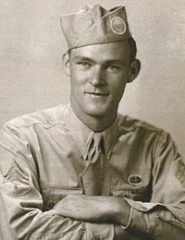Joseph Beyrle

Joseph Beyrle
JOSEPH
BEYRLE
SOLDIER DETAILS
Purple Heart
World War II Victory Medal
French Croix de guerre
Soviet Order of the Red Banner
Medal "For the Liberation of Warsaw"
BIOGRAPHY
Joseph Beyrle was the third of seven children born to William and Elizabeth Beyrle, whose parents had come to America from Germany in the 1800s. He was six years old when the Great Depression struck. His father, a factory worker, lost his job; the family was evicted from their home and was forced to move in with Joe's grandmother. Some of his earliest memories, Beyrle later told his children, were of standing in government food lines with his father. Upon his enlistment, Beyrle volunteered to become a paratrooper, and after completing basic airborne infantry training at Camp Toccoa he was assigned to the 506th Parachute Infantry Regiment of the 101st Airborne Division, the "Screaming Eagles". His nickname was "Jumping Joe." Beyrle specialized in radio communications and demolition, and was first stationed in Ramsbury, England, to prepare for the upcoming Allied invasion from the west. After nine months of training, Beyrle completed two missions in occupied France in April and May 1944, delivering gold to the French Resistance.On 6 June, D-Day, Beyrle's C-47 came under enemy fire over the Normandy coast, and he was forced to jump from the exceedingly low altitude of 360 feet (110 meters). After landing in Saint-Côme-du-Mont, Sergeant Beyrle lost contact with his fellow paratroopers, but succeeded in blowing up a power station. He performed other sabotage missions before being captured by German soldiers a few days later. Over the next seven months, Beyrle was held in seven different German prisons. He escaped twice, only to be recaptured each time. Beyrle and his fellow prisoners had been hoping to find the Red Army, which was a short distance away. After the second escape (in which he and his companions set out for Poland but boarded a train to Berlin by mistake), Beyrle was turned over to the Gestapo by a German civilian. Beaten and tortured, he was released to the German military after officials stepped in and determined that the Gestapo had no jurisdiction over prisoners of war. The Gestapo were about to shoot Beyrle and his comrades, claiming that he was an American spy who had parachuted into Berlin. Beyrle was taken to the Stalag III-C POW camp in Alt Drewitz, from which he escaped in early January 1945. He headed east, hoping to meet up with the Soviet army. Encountering a Soviet tank brigade in the middle of January, he raised his hands, holding a pack of Lucky Strike cigarettes, and shouted in Russian, 'Amerikansky tovarishch! ("American comrade!"). Beyrle was eventually able to persuade the battalion's commander (Aleksandra Samusenko, allegedly the only female tank officer of that rank in the war) to allow him to fight alongside the unit on its way to Berlin, thus beginning his month-long stint in a Soviet tank battalion, where his demolitions expertise was appreciated Beyrle's new battalion was the one that freed his former camp, Stalag III-C, at the end of January, but in the first week of February, he was wounded during an attack by German Stuka dive bombers. He was evacuated to a Soviet hospital in Landsberg an der Warthe (now Gorzów Wielkopolski in Poland), where he received a visit from Soviet Marshal Georgy Zhukov, who, intrigued by the only non-Soviet in the hospital, learned his story through an interpreter, and provided Beyrle with official papers in order to rejoin American forces. Joining a Soviet military convoy, Beyrle arrived at the US embassy in Moscow in February 1945, only to learn that he had been reported by the US War Department as killed in action on June 10, 1944 on French soil. A funeral mass had been held in his honor in Muskegon, and his obituary was published in the local newspaper. Embassy officers in Moscow, unsure of his bona fides, placed him under Marine guard in the Metropol Hotel until his identity was established through his fingerprints. Beyrle returned home to Michigan on April 21, 1945, and celebrated V-E Day two weeks later in Chicago. He was married to JoAnne Hollowell in 1946—coincidentally, in the same church and by the same priest who had held his funeral mass two years earlier. Beyrle worked for Brunswick Corporation for 28 years, retiring as a shipping supervisor. Courtesy of WWIIuncovered.
 Eisenhower Foundation
Eisenhower Foundation
